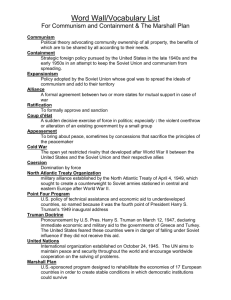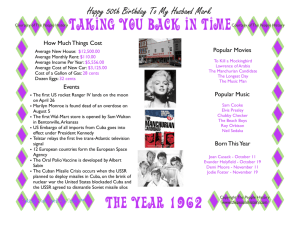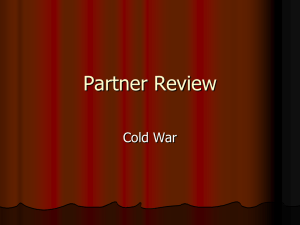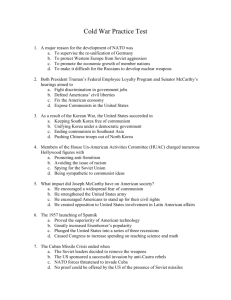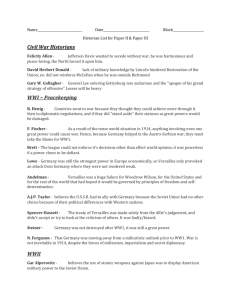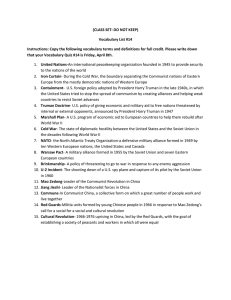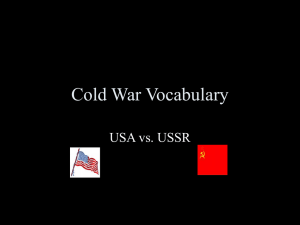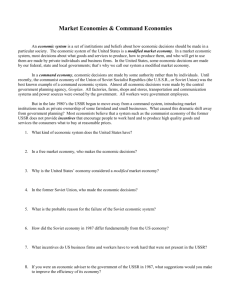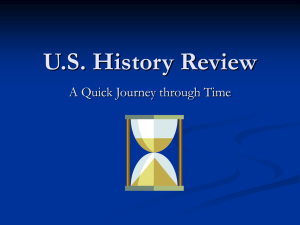5th Period - War and Diplomacy
advertisement
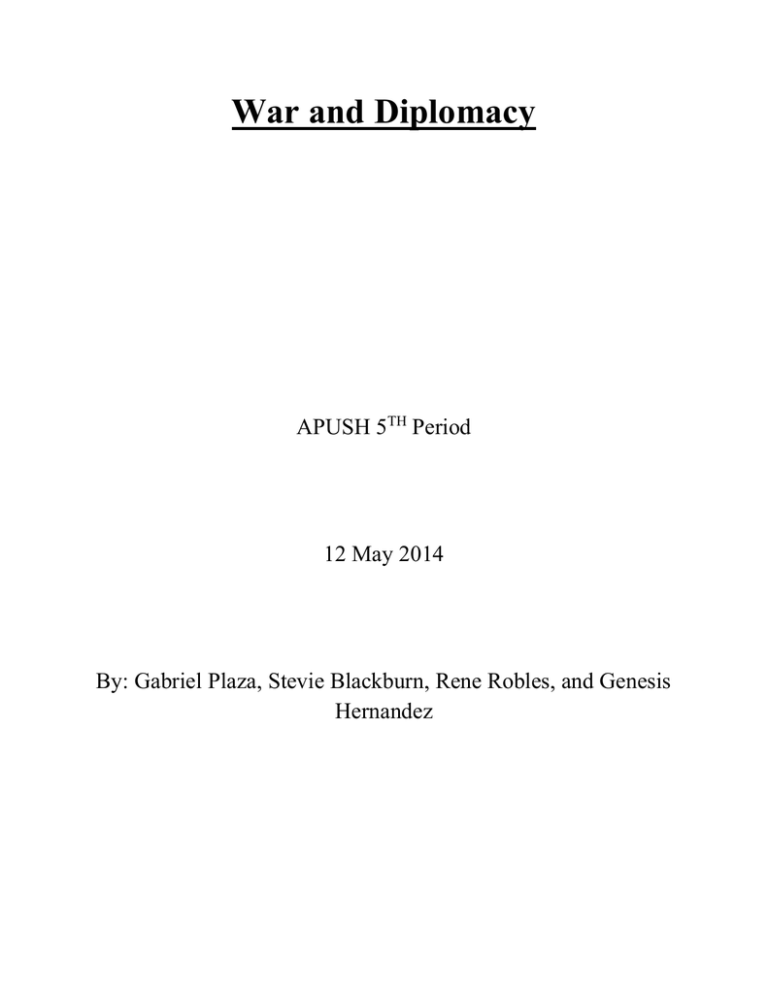
War and Diplomacy APUSH 5TH Period 12 May 2014 By: Gabriel Plaza, Stevie Blackburn, Rene Robles, and Genesis Hernandez 1600s At the turn of the century, colonization in the Americas was beginning to boom, Jamestown and Plymouth were established. However the push to survive and thrive in the new world was met with significant challenges, especially when coming to survival. As a result of this hardship, several colonials had to seek help from the Native Americans who taught the explorers how to farm and live efficiently. Friendship with these tribes was forged, including trading. However, this would serve to also entangle the colonials into alliances that would bring them into wars and other such negative aspects as a result of these new found alliances. These wars would become pivotal in the formation of how the colonies were formed and run. 1700s With the turn of the century, the 1700s would lead to a war over empires and eventually the war to start America’s future. In 1754, the French and Indian War sparked, causing a “war for empires”. The war was caused by the English settlers moving into the Ohio Valley and disrupting the French who were simply attempting to protect their fur trade and control of the region. With a few battles the British quickly declared was on France in 1756. The result of the war would lead to British victory and their control over every colony in 1763. In the aftermath of the war, Native Americans would rebel against the British in Pontiac’s Rebellion. No form of heavy resistance would occur until April 1775. With the shot heard ‘round the world in Concord, the colonies would now fight for their freedom against the Loyalists, those who remained loyal to the crown, and British rule. To rally colonists support for their cause, Common Sense would be published in 1776 by Thomas Pain. The pamphlet would advocate for colonial independence and argue for republicanism over monarchy. After a year of minor skirmishes led by the commander of the Continental Army George Washington, the colonies would officially come together and create the Declaration of Independence, written by Thomas Jefferson on July 4, 1776. With independence declared, it would take several years of fighting until the British would surrender at Yorktown on October of 1781. Due to the FrancoAmerican Alliance, negotiated by Benjamin Franklin in 1778, the French aided the colonists massively against the British. The document that would officially grant independence from Britain would be The Treaty of Paris signed in 1783. In the years following the American Revolution, The Shay and Whisky Rebellion would cause farmers to fight against economic and political unfairness in the new nation. While conflicts arose in the country, more would soon follow when Washington sent John Jay to England to sign Jay’s Treaty to stop British relations in free trade. With these issues that would take place, President Washington would leave the office with warning to remain neutral and create no foreign entanglements in Washington’s Farwell Address. President Adams, president following Washington, would then ignore Washington’s advise and become involved with France, due to France’s retaliation of Jay’s Treaty. The incident that avoided such conflict was the XYZ Affair. With this intervention, war was prevented. 1800-1850 The War of 1812 and the Mexican American War were major conflicts between the US and foreign countries between the time period of 1800-1850. Before the wars the US were isolationists and later transformed into expansionists. After the War of 1812 James Monroe implemented the Monroe Doctrine in which the US would no longer tolerate interference from foreign countries and therefore it made America believe that they had to become the protector. During Monroe’s terms it was a time of strong nationalism, economic growth, and territorial expansion which would be known as Era of Good Feelings. There was only one political party and there was no partisan conflicts. Mexico broke diplomatic relations with the US because the US annexed Texas. The Mexican War was fought over boarder disputes. The Mexican war caused America to gain a numerous amount of territory which feed the US’s desire to expand and take Manifest Destiny globally. Mexico’s economy was devastated because the US paid Mexico 15 million for all the land acquired by the Treaty of Guadalupe Hidalgo and the American economy prospered. All the new land gave Americans the room to expand, and with the additional land the need for slaves increased as well. 1851-1900 The Civil War changed America and Americans for decades to come. Before the Civil War the US were expansionist and after the war there were expansionist as well as imperialist. They became the leading power in the world. The war eventually was fought because of slavery because of the Emancipation Proclamation. After the Civil War the US began Reconstruction which modernized the south. The economy in the south was devastated but in the north the economy was booming because of industrialization. President McKinley established the Wilson-Gorman Act which some believe it was one of the causes of the Spanish American War. Americas increased nationalism led them to believe that their way of life was better and wanted to spread it globally. The US wanted to expand so they took Hawaii and Cuba, which the Teller Amendment was applied to Cuba .In addition to Cuba they gained the Philippines, Puerto Rico, and Guam. 1901-1950 Entering the twentieth century was not long before new conflicts arose. Starting in 1901, The Cuban and Platt Amendment was enforced by the United States which ended US military occupation in Cuba and it would lay down eight conditions that the Cuban government had to agree upon before the United States would withdraw. The United States had an immense amount of imperial power on new territories which would include control of the Philippines where the United States were in charge of the Philippines. Soon after in 1904 the United States emerged the Panama Canal. The canal was built in Panama to make travel easier for the US Naval to travel between oceans in a quicker manner. Later in this same year Roosevelt made a few adjustments to the previous Monroe Doctrine which was known as Roosevelt’s Corollary to the Monroe Doctrine. Ironically enough on July 28, 1914 the Great War started, World War I, in which the United States decided to be in isolationism rather than join the war in an instant with the power they had at the start of the century. Finally in 1917 the United States joined the war. With Woodrow Wilson in office the Espionage Act of 1917 was passed along with Sedition Act of 1918 branching out of the espionage act. World War I questioned the first amendment especially in the court case of Schneck vs. United States which brought to question the draft of the war. Wilson then introduced his Fourteen Points where he wanted to start The League of Nations in which he died before it could come to place. The war ended with The Treaty of Versailles where Germany was blamed for the war in its entire. Once the war ended, soon world naval powers would gather in Washington Conference 1921-1922 where they would discuss the growing tensions in East Asia in order to prevent another war. Several acts were passed such as the Kellogg-Briand Pact 1928, Good Neighbor Policy, and The Neutrality Act of the 1930s in order to prevent an inevitable second great war. In 1939 World War II lit its fire. During the war, America was fighting mainly with the Japanese which led to internment camps for Japanese Americans in suspicion that they would be spies. In yearn for unity of the world, the United Nations was implemented. The United Nations were and arrangement created by the former president Franklin D. Roosevelt where 26 nations gathered in pledge to fight together against the axis powers on January 1, 1942. Unfortunately FDR died before the war came to an end but what was on his desk was now in the hands of Truman. Atomic Bombs were to be dropped on Japan to end the war with Japan. Two atomic bombs were dropped on Hiroshima and Nagasaki in the midst of the war by the United States. By 1945 World War II was over. The new superpowers after the war were now the United States and the Soviet Union. The USSR wanted the world to become communist and their next targets were Greece and Turkey. Truman asked congress for aid to the two countries which was known as the Truman Doctrine and began to use containment American power to prevent the Soviets of taking control. Truman then installed The Marshall Plan that sent money to countries of Western Europe in order for them not to become communist. Then in 1949 the North Atlantic Treaty Organization was formed NATO by the United States and eleven other nations to conation Soviet aggression against Western Europe. Before that in 1948 the United States were involved in the Berlin Airlift where the Soviets no longer wanted allies in Berlin and Truman refused until Stalin blocked all entrances so no goods could come in and Truman provided them with goods through the usage of planes. Lastly in 1950, Truman aided the French in Vietnam in order for Vietnam not to fall to communism. 1951-Current Day As the 1950s began, the United States would find itself in an ideological war with the other world superpower, the USSR. We were poised to insure the collapse of Communism, and to do this we believed in Containment, the policy of keeping Communism from spreading abroad. Rather than confront the USSR directly, we fought in a series of proxy wars to expand our influence and restrict the Soviet’s. This era would be known as the Cold War, a war entirely different from past ones, a war of ideas and technologies, one that if it were to get hot, could’ve ended humanity’s stay on the Earth. 1600s Pequot War- After Bay colonists had demanded the claim to Connecticut, the Pequot who had owned the land refused. As a retaliation, the colonists burned their village and as a result killing 400 Pequot Natives. Bacon’s Rebellion- Lead by Nathaniel Bacon and followed by 500 farmers against the rule of Governor Berkeley after the issue of their safety was disregarded. The objective was to lead a popular revolt, and motivate an attack against the Natives. Eventually Bacon burned the capital of Jamestown after chasing Berkeley from the town. King Phillip’s War- A war between colonists against Native Americans allied under the American identity, as there was little British support to fight this war. 1700s French and Indian war- war fought between French/Indian and British/Indian George Washington- leader of the continental army Pontiac’s Rebellion- Native American tribes on Ohio Valley that attacked colonial outposts Battle of Lexington- first battle of American Revolution Battle of Concord- battle of American Revolution which pushed the colonists to Boston Loyalists- those who were loyal to the crown while living in the colonies Declaration of Independence- document created to enumerate the colonies grievances against the crown and articulate the principal of individual liberty Franco-American Alliance- Alliance made between colonists and French to fight together against the British Benjamin Franklin- colonist who helped negotiate the France-American Alliance Battle of Yorktown- Final battle of American Revolution Shay’s Rebellion- rebellion lasting from 1786-1787 when farmers marched against unfair policies Whiskey Rebellion- rebellion where farmers resisted an excise tax on whiskey Washington’s Farewell Address- Washington’s speech that warned the nation to not intervene with foreign nations and remain neutral Jay’s Treaty- treaty created to stop British violations of free trade (made with too many concessions toward the British) XYZ Affair- three diplomats traveled to France to negotiate terms of peace with the French, John Adams deleted the French officials’ names and replaced them with an X,Y, and Z 1800-1850 Isolationist -avoiding political or economic entanglements with other countries. Expansionist -A nation's practice or policy of territorial or economic expansion James Monroe -A political leader of the late eighteenth and early nineteenth centuries; a leader of the Democratic-Republican party. He was president from 1817 to 1825, between James Madison and John Quincy Adams. He issued the Monroe Doctrine in 1823, supporting the independence of Spain's colonies in America. The Missouri Compromise was reached in his presidency. Monroe Doctrine -an American foreign policy opposing interference in the Western hemisphere from outside powers Era of Good Feelings- period in the political history of the United States that reflected a sense of national purpose and a desire for unity among Americans in the aftermath of the Napoleonic Wars Partisan conflict- conflict between parties Manifest destiny-a belief shared by many Americans in the mid-1800s that the United States should expand across the continent to the Pacific Ocean Treaty of Guadalupe hidalgo -Ended Mexican-American War; Mexico gave up all claims to land from Texas to California for $15 million 1851-1900 Civil War -1861 to 1865, after seven Southern slave states declared their secession and formed the confederate south and the north union Expansionist- A nation's practice or policy of territorial or economic expansion Imperialist -The policy of extending a nation's authority by territorial acquisition or by the establishment of economic and political Emancipation Proclamation -September 22, 1862 - Lincoln freed all slaves in the states that had seceded, after the Northern victory at the Battle of Antietam. Lincoln had no power to enforce the law. Reconstruction -1865-1877 Period after the Civil War during which Northern political leaders created plans for the governance of the South and a procedure for former Southern states to rejoin the Union; Southern resentment of this era lasted well into the twentieth century Industrialization- is the period of social and economic change that transforms a human group McKinley - was the 25thnPresident of the United States, serving from March 4, 1897, until his assassination in September 1901, McKinley led the nation to victory in the Spanish–American War, raised protective tariffs to promote American industry. Wilson-Gorman Act -Reduced Rates of McKinley Tariff to 41.3% and issued a 2% income tax which lasted less then a year. Spanish American War -Oppression of Cuba and Imperialistic Desires of USA nationalism -creed or political ideology that involves an individual identifying with, or becoming attached to, one's nation Teller Amendment- Legislation that promised the US would not annex Cuba after winning the Spanish-American war 1901-1950 Cuban and Platt Amendent- withdrew American troops from Cuba Panama Canal- an easier passage way between oceans that cause a war between the US and Columbia in order for Panama to have its independence from Columbia Roosevelt’s Corollary to the Monroe Doctrine- with his Big Stick Policy TR made the US the police of the world World War I- war fought over imperialism and military power between the Allies and the Central Powers Isolationism- the United States were isolated from the war which meant they wanted to stay neutral throughout the war Espionage Act of 1917- Law which punished people for aiding the enemy or refusion military duty during the war Sedition Act of 1918- act that deemed “disloyal, profane, or abusive language” about the US government was added to the Espionage Act Schenck vs. United States- a legal case in which it was ruled that government can limit free speech if the speech provokes a “clear and present danger” of substantive evils Fourteen Points- a list of foreign policy goals which Woodrow Wilson hoped to achieve the aftermath of World War I The League of Nations- proposed union of the world powers after WWI Treaty of Versailles- Treaty that ended WWI that blamed Germany for the entire war and made Germany pay for the war Washington Conference 1921-1922- conference that was attended by nine nations in which the Soviet Union was not invited to discuss the Pacific Ocean and East Asia and was the first international conference held in the US and the first disarmament in history Kellogg-Briand Act- promised to never make war again and settle all disputes peacefully was signed by sixty-two nations Good Neighbor Policy- withdrawal of American troops from foreign nations to improve international relations and unite western hemisphere Neutrality Act of 1930- prohibited aiding of belligerent nations, banned civilian involvement; limited power of president during the war and built up armed forces World War II- war fought over territory United Nations- bundle of nations working together in order to prevent future world wars Atomic Bombs- two bombs that were part of the Manhattan Project and were dropped on Hiroshima and Nagasaki to end the war with Japan Truman Doctrine- declaration to congress to send money to Greece and Turkey in order for them not to fall to communism Containment- use of American Power to prevent Soviets from powering over a country The Marshall Plan- US sent money to Western Europe to help them get back on their feet and not fall to communism NATO- nations came together to prevent Soviet aggression against Western Europe Berlin Airlift- supplement of goods to Western Berlin that was blockaded by the soviets via airplanes from the Unites States. 1951-Present Day The Cold War- An engagement between the U.S. and USSR, never directly fought but rather through proxy wars. Construction of the Berlin Wall(1961)- Built by the Soviet Union in order to restrict the movement of East Berlin citizens, and to keep them in East Germany. The Korean War(1951-51)-Began when the communist backed North invaded Capitalist South, the first instance of containment by the U.S. Eventually involved Maoist China to support North Korea, ending in armistice. Massive Retaliation-The idea that if a country is attacked, it would result in a retaliation massive enough to cripple and destroy the enemy. Domino Theory- Coined by LBJ, declared that if one country fell to Communism, the others around it would as well. Sputnik(1957)- The first artificial satellite launched by humanity, created by the USSR. Would begin the space race between the US and USSR. Bay of Pigs Invasion- Led by the CIA, was on invasion of Cuba by Cuban exiles to overthrow Fidel Castro, massive failure, and resulted in an American emarassement. Cuban Missile Crisis-Began when photos of Soviet missile sites in Cuba became apparent. 13 day standoff, with the US demanding their removal, almost resulted in a nuclear exchange and an invasion of Cuba. The Peace Corps and other nation building- In order to fight the influence of Communism inherent in Third-World nations, organizations started to help impoverished nations. The Vietnam War- War between Communist North Vietnam, against South Vietnam and the United States, lasting from 1865 to 1875, resulting in US withdrawal and a victory for Communism. Viet Cong- South Vietnamese communist guerillas, created by Ho Chi Minh in order to wage a guerilla against the South Vietnamese Government. Gulf of Tonkin Resolution- Gave the President power to use US forces in order to protect American interests without Congress approval. Draft and Opposition to the War- As a result of the underprivileged being forced to fight what was regarded as the rich white man’s war, widespread protests broke out. Also caused by really seeing no point to the war. Tet Offensive-North Vietnamese offensive that was a military defeat but morale victory, showing the American public how motivated the North Vietnamese were, and how the war was unwinnable Vietnamization- The gradual handover of the war to the South Vietnamese government. Bombing of Cambodia- Air strikes against Cambodia in order to disrupt Viet Cong and V+NVA supply routes. War Powers Act of 1973- Restricted the power of the President from using US forces without Congress approval. Détente-The “thaw” of the Cold War, resulting in treaties between the US and USSR Nixon Doctrine- Stated that the US would assist allies in defense and act as a nuclear umbrella but would not be responsible for all the defense of their allies. Iranian Hostage Crisis-After the Islamic Revolution in Iran, radicals took 70+ Americans hostage in the American Embassy, lasting for 444 days. The Collapse of Communism- In 1991, economic stagnation and military overreach took a toll on the Soviet Union and all Warsaw Pact nations, forcing the Soviet Union to officially dissolve in December of 1991.
